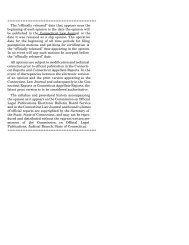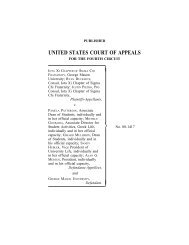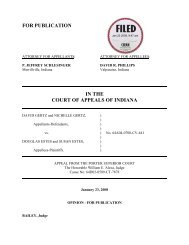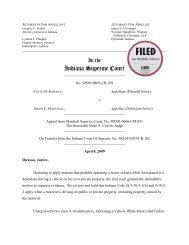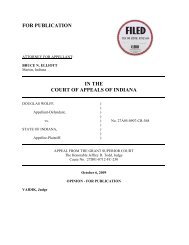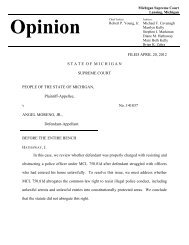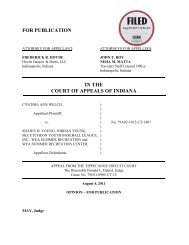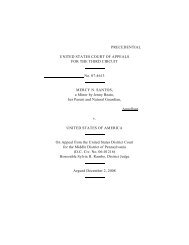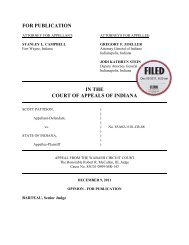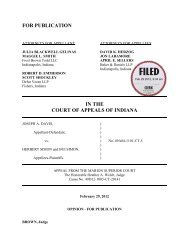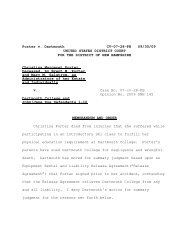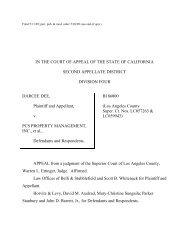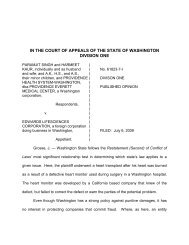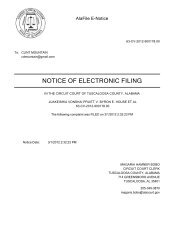Case 1:08-cv-00112-GBL-BRP Document 14 Filed 04/02/2008 Page ...
Case 1:08-cv-00112-GBL-BRP Document 14 Filed 04/02/2008 Page ...
Case 1:08-cv-00112-GBL-BRP Document 14 Filed 04/02/2008 Page ...
Create successful ePaper yourself
Turn your PDF publications into a flip-book with our unique Google optimized e-Paper software.
Edward T. Laios,<br />
v.<br />
<strong>Case</strong> 1:<strong>08</strong>-<strong>cv</strong>-<strong>00112</strong>-<strong>GBL</strong>-<strong>BRP</strong> <strong>Document</strong> <strong>14</strong> <strong>Filed</strong> <strong>04</strong>/<strong>02</strong>/20<strong>08</strong> <strong>Page</strong> 1 of 13<br />
Plaintiff,<br />
Michael A. Wasylik,<br />
Defendant.<br />
IN THE UNITED STATES DISTRICT COURT FOR THE<br />
EASTERN DISTRICT OF VIRGINIA<br />
ALEXANDRIA DIVISION<br />
)<br />
)<br />
) <strong>Case</strong> No. <strong>08</strong>-112 (<strong>GBL</strong>)<br />
)<br />
)<br />
)<br />
MEMORANDUM ORDER<br />
THIS MATTER is before the Court on Defendant, Michael A.<br />
Wasylik's Motion to Dismiss or, in the alternative, Motion for<br />
Summary Judgment. Plaintiff, Edward T. Laios, claims that<br />
Michael Wasylik, his attorney, committed legal malpractice and<br />
was in breach of contract after Wasylik failed to refile a<br />
lawsuit within the applicable statute of limitations. The issue<br />
before the Court is whether Laios's suit is time barred under the<br />
statute of limitations. The Court grants Wasylik's Motion for<br />
Summary Judgment because the parties entered into an oral<br />
contract effectively time barring this suit under the three year<br />
statute of limitations for oral contracts.<br />
I. BACKGROUND<br />
In 2 001, Laios sought legal assistance from James M. Loots,<br />
an attorney licensed in the District of Columbia, who had<br />
represented Laios on prior occasions. (Decl. James M. Loots, U<br />
1, Feb. 22, 20<strong>08</strong>.) Loots, who is not licensed to practice law in<br />
1
<strong>Case</strong> 1:<strong>08</strong>-<strong>cv</strong>-<strong>00112</strong>-<strong>GBL</strong>-<strong>BRP</strong> <strong>Document</strong> <strong>14</strong> <strong>Filed</strong> <strong>04</strong>/<strong>02</strong>/20<strong>08</strong> <strong>Page</strong> 2 of 13<br />
Virginia, referred Laios to Wasylik. (Decl. James M. Loots, f<br />
1.) On December 19, 2001, Laios and Wasylik met and discussed<br />
filing a lawsuit to recover the proceeds of a loan against MGM<br />
Settlements, Inc., Grethel Valverde, SLH Consulting, Inc., and<br />
Steven L. Harrell (hereinafter "MGM lawsuit"). (Compl. f 6.)<br />
The next day, December 20, 2 001, Wasylik sent Loots a letter<br />
stating that he met with Laios the previous day. (Mem. in Opp'n<br />
to Def.'s Mot. to Dismiss at 1.) In the letter, Wasylik confirms<br />
that he filed a complaint on behalf of Laios on December 19,<br />
2001, and reiterated the fee agreement between the parties,<br />
wherein Loots would pay Wasylik $125.00 per hour in cash, up to a<br />
limit of $1,000 through December 31, 2001, for legal services<br />
provided by Wasylik to Laios. Wasylik also stated that he had<br />
already incurred $232.00 in expenses for the filing fees and<br />
process service fee for filing the suit on behalf of Plaintiff.<br />
At the end of the letter was the typed name "Mike Wasylik."<br />
There was no handwritten signature on the letter produced in this<br />
case. (Mem. in Opp'n, Ex. 1.) Laios and Wasylik never signed a<br />
written fee agreement. (Decl. Michael Alex Wasylik, Feb. 9,<br />
20<strong>08</strong>.)<br />
Wasylik litigated the MGM lawsuit from December 19, 2001,<br />
the day he filed the complaint, through March 24, 2003. On March<br />
24, 2 003, Wasylik, with the consent of Laios, moved for nonsuit.<br />
(Compl. U 16.) Wasylik had six months to refile claims; however,
<strong>Case</strong> 1:<strong>08</strong>-<strong>cv</strong>-<strong>00112</strong>-<strong>GBL</strong>-<strong>BRP</strong> <strong>Document</strong> <strong>14</strong> <strong>Filed</strong> <strong>04</strong>/<strong>02</strong>/20<strong>08</strong> <strong>Page</strong> 3 of 13<br />
he failed to do so. (Id. f 19.)<br />
Laios filed a complaint against Wasylik in the Virginia<br />
Circuit Court of Fairfax County alleging legal malpractice and<br />
breach of contract. Wasylik removed the case to federal court<br />
and is presently seeking dismissal of the claim pursuant to<br />
Federal Rule of Civil Procedure (12)(b)(6), or, in the<br />
alternative, for summary judgment pursuant to Federal Rule of<br />
Civil Procedure 56®.<br />
A. Standard of Review<br />
II. DISCUSSION<br />
1- Fed. R. Civ. P. 12 (b) (6) - Failure to State a Claim<br />
Upon Which Relief May Be Granted<br />
Federal Rule of Civil Procedure 12(b)(6) motions should be<br />
granted unless an adequately stated claim is "supported by showing<br />
any set of facts consistent with the allegations in the<br />
complaint." Fed. R. Civ. P. 12(b) (6); Bell Atlantic Corp. v.<br />
Twombly, 127 S. Ct. 1955, 1969 (2007). In considering a Rule<br />
12(b)(6) motion, the Court must construe the complaint in the<br />
light most favorable to the plaintiff, read the complaint as a<br />
whole, and take the facts asserted therein as true. Mylan Labs,<br />
Inc. v. Matkari, 7 F.3d 1130, 1134 (4th Cir. 1993). Additionally,<br />
courts must consider the complaint in its entirety, as well as<br />
other sources, such as documents incorporated into the complaint
<strong>Case</strong> 1:<strong>08</strong>-<strong>cv</strong>-<strong>00112</strong>-<strong>GBL</strong>-<strong>BRP</strong> <strong>Document</strong> <strong>14</strong> <strong>Filed</strong> <strong>04</strong>/<strong>02</strong>/20<strong>08</strong> <strong>Page</strong> 4 of 13<br />
by reference, and matters of which a court may take judicial<br />
notice. Tellabs v. Makor Issues & Rights, 12 7 S. Ct. 24 99, 2509<br />
(2007). Conclusory allegations regarding the legal effect of the<br />
facts alleged need not be accepted. Labram v. Havel, 43 F.3d<br />
918, 921 (4th Cir. 1995). Because the central purpose of the<br />
complaint is to provide the defendant "fair notice of what the<br />
plaintiff's claim is and the grounds upon which it rests," the<br />
plaintiff's legal allegations must be supported by some factual<br />
basis sufficient to allow the defendants to prepare a fair<br />
response. Conley v Gibson, 355 U.S. 41, 47 (1957).<br />
2. Fed. R. Civ. P. 56(c)- Summary Judgment<br />
Under Rule 56(c) the Court must grant summary judgment if<br />
the moving party demonstrates that there is no genuine issue as to<br />
any material fact, and that the moving party is entitled to<br />
judgment as a matter of law. Fed. R. Civ. P. 56 (c). In reviewing<br />
a motion for summary judgment, the Court views the facts in a<br />
light most favorable to the non-moving party. Anderson v. Liberty<br />
Lobby, Inc., 477 U.S. 242, 255 (1996). Once a motion for summary<br />
judgment is properly made and supported, the opposing party has<br />
the burden of showing that a genuine dispute exists. Matsushita<br />
Elec. Indus. Co. v. Zenith Radio Corp., 475 U.S. 574, 586-87<br />
(1986). The mere existence of some alleged factual dispute<br />
between the parties will not defeat an otherwise properly<br />
supported motion for summary judgment; the requirement is that
<strong>Case</strong> 1:<strong>08</strong>-<strong>cv</strong>-<strong>00112</strong>-<strong>GBL</strong>-<strong>BRP</strong> <strong>Document</strong> <strong>14</strong> <strong>Filed</strong> <strong>04</strong>/<strong>02</strong>/20<strong>08</strong> <strong>Page</strong> 5 of 13<br />
there be no genuine issue of material fact. Anderson, 477 U.S. at<br />
248. A "material fact" is a fact that might affect the outcome of<br />
a party's case. Anderson, 477 U.S. at 248; JKC Holding Co. v.<br />
Wash. Sports Ventures, Inc., 264 F.3d 459, 465 {4th Cir. 2001).<br />
Whether a fact is considered to be "material" is determined<br />
by the substantive law, and "[o]nly disputes over facts that might<br />
affect the outcome of the suit under the governing law will<br />
properly preclude the entry of summary judgment." Anderson, 477<br />
U.S. at 248; Hooven-Lewis v. Caldera, 249 F.3d 259, 265 (4th Cir.<br />
2001). A "genuine" issue concerning a "material" fact arises when<br />
the evidence is sufficient to allow a reasonable jury to return a<br />
verdict in the nonmoving party's favor. Anderson, 477 U.S. at<br />
248. "Rule 56(e) requires the nonmoving party to go beyond the<br />
pleadings and by [his] own affidavits, or by the 'depositions,<br />
answers to interrogatories, and admissions on file,' designate<br />
'specific facts showing that there is a genuine issue for trial.'"<br />
Celotex Corp. v. Catrett, 477 U.S. 317, 324 (1986).<br />
B. Analysis<br />
This Court grants Wasylik's Motion for Summary Judgment<br />
because Laios's complaint was not filed within the applicable<br />
statute of limitations for the oral contract formed. The Court<br />
grants Wasylik's Motion for Summary Judgment because the Court<br />
looks outside the pleadings to come to its decision. In<br />
Virginia, the applicable statute of limitations for legal
<strong>Case</strong> 1:<strong>08</strong>-<strong>cv</strong>-<strong>00112</strong>-<strong>GBL</strong>-<strong>BRP</strong> <strong>Document</strong> <strong>14</strong> <strong>Filed</strong> <strong>04</strong>/<strong>02</strong>/20<strong>08</strong> <strong>Page</strong> 6 of 13<br />
malpractice suits are the statute of limitations for breaches of<br />
contracts. MacLellan v. Throckmorton, 367 S.E.2d 720, 721 (Va.<br />
1988) (relying on Oleyar v. Kerr, 225 S.E.2d 3 98, 3 99 (1976));<br />
Federal Deposit Ins. Corp. v. Cocke, 7 F.3d 396, 403 (4th Cir.<br />
1993). If the parties enter into a written contract, signed by<br />
the party to be charged, or by his agent, the statute of<br />
limitations is five years. Va. Code Ann. § 8.01-246(2) (2007); see<br />
generally Richmond Standard Steel Spike & Iron Co. v.<br />
Chesterfield Coal Co., 160 F. 832, 834 (4th Cir. 19<strong>08</strong>)(stating<br />
there was no written contract where the party to be charged did<br />
not sign the contract but had its typewritten name on the<br />
contract); Tyler Gilman Corp. v. Williams, 221 S.E.2d 129, 131<br />
(Va. 1976)("the listing of a stale debt upon an unsigned<br />
corporate financial statement . . . has been held not to<br />
constitute an acknowledgment sufficient to support a new promise<br />
to pay the debt"). However, if the parties enter into an<br />
unwritten contract, express or implied, the statute of<br />
limitations is three years. Id. § 8.01-246(4).<br />
In order to constitute a written contract the "essential<br />
terms of the agreement must be obvious on the face of the writing<br />
without recourse to parol evidence." Janus v. Sproul, 458 S.E.2d<br />
300, 301 (Va. 1995)(citing Rahm v. Klerner, 37 S.E. 292, 293 (Va.<br />
1900)); see Beekman v. Cornhusker Farms, 333 N.W.2d 918, 920<br />
(Neb. 1983)("[I]f a written agreement is so indefinite as to
<strong>Case</strong> 1:<strong>08</strong>-<strong>cv</strong>-<strong>00112</strong>-<strong>GBL</strong>-<strong>BRP</strong> <strong>Document</strong> <strong>14</strong> <strong>Filed</strong> <strong>04</strong>/<strong>02</strong>/20<strong>08</strong> <strong>Page</strong> 7 of 13<br />
necessitate a resort to parol testimony to make it complete, the<br />
statute of limitations concerning contracts not in writing would<br />
be applicable.")(citations and internal quotations omitted).<br />
When the parties could have easily drafted a document that would<br />
have constituted a written contract, but did not, the writings<br />
created after the initial oral contract was written "merely . . .<br />
memorialize the oral contract but do not merge it into a written<br />
contract." Digital Support Corp. v. Avery, 4 9 Va. Cir. 324, 1999<br />
WL 796745 1 (Va. Cir. Ct. July 13, 1999).<br />
In Marley Mouldings Inc. v. Suyat, the court applied the<br />
Newport News "complete and concluded" standard to determine<br />
whether an attorney and client entered into an oral or written<br />
contract for purposes of calculating the statute of limitations.<br />
970 F. Supp. 4 96, 4 99 (W.D. Va. 1997)(relying on Newport News<br />
Hampton & Old Point Dev. Co. v. Newport News Street Ry. Co., 32<br />
S.E. 789, 790 (Va. 1899). The plaintiff, Marley Mouldings,<br />
wanted to bring a legal malpractice claim against a law firm,<br />
Flehr, Hohbach, Test, Albritton & Herbert ("Flehr, Hohbach") that<br />
provided services in connection to patent applications. Marley<br />
Mouldings, 970 F. Supp. at 497. Marley Mouldings produced three<br />
letters as evidence of a written contract between the parties.<br />
The first was sent from DG Shelter Products (Marley Mouldings1<br />
predecessor) to Flehr, Hohbach asking the firm to review a patent<br />
process. Id. at 499. The second letter was sent from Flehr,
<strong>Case</strong> 1:<strong>08</strong>-<strong>cv</strong>-<strong>00112</strong>-<strong>GBL</strong>-<strong>BRP</strong> <strong>Document</strong> <strong>14</strong> <strong>Filed</strong> <strong>04</strong>/<strong>02</strong>/20<strong>08</strong> <strong>Page</strong> 8 of 13<br />
Hohbach to Marley Mouldings confirming that a request for a<br />
novelty search on the patent application had been sent as<br />
discussed in an earlier meeting. Id. The final letter was from<br />
Reginald Suyat, an attorney at Flehr, Hohbach, to DG Shelter with<br />
a draft of the actual application for the patent. Id. The court<br />
held that the three letters did not amount to a written agreement<br />
because the court had to imply several terms, the subject matter<br />
of the contract was ambiguous, and there was no agreement as to<br />
consideration or duration of services. Id. The court concluded<br />
that there was a "definite impression that there must be<br />
something more to the contract" and as a result, the court deemed<br />
the letters insufficient to constitute a written contract because<br />
the letters were not "complete and concluded." Marley Mouldings,<br />
970 F. Supp. at 500.<br />
Similarly, the court in Lockney v. Vroom was also asked to<br />
determine whether the plaintiff, Lockney, had entered into a<br />
written or oral contract with Vroom, an attorney working for<br />
Lascara & Associates. 61 Va. Cir. 359, 2003 WL 22382577 1 (Va.<br />
Cir. Ct. Mar. 21, 2003). Lockney met with Vroom and discussed<br />
the possibility of filing a lawsuit against Lockney1s former<br />
employer. Id. At the meeting, Lockney paid Lascara & Associates<br />
a $3 00.00 retainer. Id. Ten days later, Vroom forwarded to<br />
Lockney a "Fee and Cost Agreement." In the agreement Vroom<br />
stated the fees the firm would charge regarding the specific
<strong>Case</strong> 1:<strong>08</strong>-<strong>cv</strong>-<strong>00112</strong>-<strong>GBL</strong>-<strong>BRP</strong> <strong>Document</strong> <strong>14</strong> <strong>Filed</strong> <strong>04</strong>/<strong>02</strong>/20<strong>08</strong> <strong>Page</strong> 9 of 13<br />
suit. Id. Vroom signed the letter, sent it to Lockney, who also<br />
signed the agreement, and returned it to Vroom. Id.<br />
Additionally, a subsequent letter was sent from Vroom to Lockney<br />
identifying the legal issues and requesting further information.<br />
Id. at 3. The court held that the legal matters addressed in the<br />
letters were governed by the five year statute of limitations.<br />
Id. at 4. However, the other legal matters that were discussed<br />
between the parties but were not committed to writing were<br />
governed by the three year statute of limitations. Id.<br />
Here, Laios and Wasylik entered into an oral contract on<br />
December 19, 2001, when the parties agreed that Wasylik would<br />
represent Laios in the MGM lawsuit. The next day, Wasylik wrote<br />
a letter to Loots informing him of the terms of Laios and<br />
Wasylik's agreement. The December 20, 2001, letter states<br />
"[f]irst, we agreed that I would file yesterday, as I did, the<br />
suit against MGM Settlements, et al. in the Fairfax County<br />
Circuit Court." The letter then states "[j]ust for your records,<br />
our fee agreement is that you will pay me $125.00 per hour . . .<br />
up to a limit of $1000.00 through December 31, 2001 . . . ."<br />
Finally, the letter concludes "[t]o date, I have incurred<br />
expenses totaling $232.00 in filing fees and process service fees<br />
for the MGM filing." (Mem. in Opp'n to Def.'s Mot. to Dismiss,<br />
Ex. l.)<br />
Wasylik's letter to Loots cannot be deemed to constitute a
<strong>Case</strong> 1:<strong>08</strong>-<strong>cv</strong>-<strong>00112</strong>-<strong>GBL</strong>-<strong>BRP</strong> <strong>Document</strong> <strong>14</strong> <strong>Filed</strong> <strong>04</strong>/<strong>02</strong>/20<strong>08</strong> <strong>Page</strong> 10 of 13<br />
written contract between Laios and Wasylik. First, the letter<br />
suggests that Laios and Wasylik reached an agreement at their<br />
meeting on December 19, 2001. During their meeting they<br />
discussed the lawsuit and Wasylik filed suit on that day,<br />
December 19th, before the letter to Loots was written. The<br />
letter to Loots was written solely for Loots's records.<br />
Furthermore, the letter cannot be considered a written contract<br />
between Wasylik and Laios because Wasylik sent and addressed the<br />
letter to Loots, not to Laios. Additionally, Laios's sworn<br />
declaration submitted to the court in relation to this motion<br />
provides further evidence that during his meeting with Wasylik on<br />
December 19, 2001, they entered into an oral agreement because<br />
they agreed on terms of the lawsuit. Laios stated that "Mr.<br />
Wasylik and I discussed the terms of his engagement and arrived<br />
at agreement on those terms." (Decl. of Edward T. Laios, H 5,<br />
Feb. 28, 20<strong>08</strong>.)<br />
Wasylik's letter to Loots cannot be construed as "complete<br />
and concluded" as required by Marley Mouldings. Here, like in<br />
Marley Mouldings, there was no duration of representation<br />
included in the letter from Wasylik to Loots. The only date<br />
mentioned in the letter was December 31, 2001, thus, there is no<br />
indication of how long the representation would last past<br />
December 31, 2001. Furthermore, other vital terms of an<br />
attorney-client contract were missing from the letter such as the<br />
10
<strong>Case</strong> 1:<strong>08</strong>-<strong>cv</strong>-<strong>00112</strong>-<strong>GBL</strong>-<strong>BRP</strong> <strong>Document</strong> <strong>14</strong> <strong>Filed</strong> <strong>04</strong>/<strong>02</strong>/20<strong>08</strong> <strong>Page</strong> 11 of 13<br />
obligations of the attorney and the client, whether the<br />
representation was fee-based or contingent, or what retainer fee<br />
was required. Because of the multitude of terms missing from the<br />
letter, the Court cannot consider the letter to be "complete and<br />
concluded." For this Court to determine that the letter was a<br />
written contract, parol evidence must be used to fill in the<br />
essential terms of the agreement. Similar to Janus, this Court<br />
cannot find that the letter was a written contract because the<br />
essential terms of the agreement must be obvious on the face of<br />
the writing without recourse to parol evidence.<br />
The letter from Wasylik to Loots cannot be considered a<br />
written contract because unlike in Lockney, the parties here did<br />
not clearly establish an intent to replace the oral agreement<br />
with a written agreement since Laios and Wasylik never signed any<br />
written fee agreement. The Court finds that the letter sent from<br />
Wasylik to Loots did not bear Wasylik's signature. Just as<br />
Richmond Standard Steel Spike & Iron Co. held, this Court finds<br />
that the typewritten name "Mike Wasylik" is not the equivalent of<br />
Wasylik's signature. Thus, the letter was not signed by the<br />
party to be charged. Also, unlike the attorney in Lockney,<br />
Wasylik did not send the letter to Laios, instead, he sent the<br />
letter to a third party. Similar to Digital Support Corp. v.<br />
Avery, the letter did not merge the oral contract into a written<br />
contract. The letter from Wasylik to Loots, if anything, only<br />
11
<strong>Case</strong> 1:<strong>08</strong>-<strong>cv</strong>-<strong>00112</strong>-<strong>GBL</strong>-<strong>BRP</strong> <strong>Document</strong> <strong>14</strong> <strong>Filed</strong> <strong>04</strong>/<strong>02</strong>/20<strong>08</strong> <strong>Page</strong> 12 of 13<br />
memorialized the terms of Laios and Wasylik's oral contract.<br />
Laios also argues that the date the statute of limitations<br />
began to run is a material fact in dispute and summary judgment<br />
should not be granted. The date the statute of limitations began<br />
is not a material fact because either date suggested by the<br />
parties in their motions, March 24, 2003, or September 24, 2003,<br />
will be barred by the three year statute of limitations for oral<br />
contracts.<br />
As a result, this Court finds that the letter written on<br />
December 20, 2001, does not constitute a written agreement nor<br />
does the Wasylik letter supplant the oral discussions that took<br />
place on December 19, 2 001. On December 19, 2001, Laios and<br />
Wasylik entered into an oral contract; therefore, the statute of<br />
limitations is three years. Since this suit was filed outside<br />
the three year statute of limitations, the lawsuit is time barred<br />
and is accordingly dismissed.<br />
III. CONCLUSION<br />
The Court holds that Laios and Wasylik entered into an oral<br />
contract on December, 19 2001, and the statute of limitations for<br />
the oral contract is three years. Laios filed suit after the<br />
expiration of the statute of limitations; therefore, Wasylik's<br />
Motion for Summary Judgment is granted and the case is dismissed.<br />
12
<strong>Case</strong> 1:<strong>08</strong>-<strong>cv</strong>-<strong>00112</strong>-<strong>GBL</strong>-<strong>BRP</strong> <strong>Document</strong> <strong>14</strong> <strong>Filed</strong> <strong>04</strong>/<strong>02</strong>/20<strong>08</strong> <strong>Page</strong> 13 of 13<br />
GRANTED.<br />
For the foregoing reasons, it is hereby<br />
ORDERED that Wasylik's Motion for Summary Judgment is<br />
The Clerk is directed to enter a Federal Rules of Civil<br />
Procedure 58 final judgment in favor of Michael A. Wasylik and<br />
against Edward T. Laios in a separate judgment order.<br />
Counsel.<br />
The Clerk is directed to forward a copy of this Order to<br />
ENTERED this of April, 20<strong>08</strong>.<br />
Alexandria, Virginia<br />
Gerald Bruce Lee<br />
United States District Judge<br />
13



